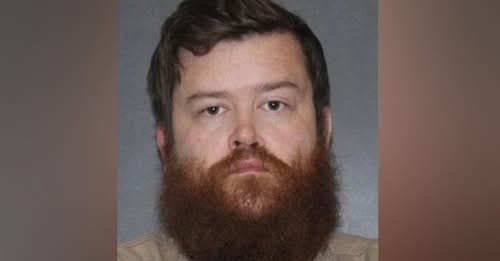
ELKHART, Ind. — A deadly shooting early Tuesday morning at the Daylite Inn motel on Cassopolis Street has resulted in a murder charge against 35-year-old Nicholas Stanley, who is accused of killing Allen Cogswell, also 35, a recently released sex offender. The incident has sparked a mixture of shock, questions of vigilantism, and concern over the cycle of violence in communities still grappling with the presence of former offenders.
According to investigators and court documents, the shooting occurred just after midnight at the Daylite Inn, a modest roadside motel often used for temporary housing. The Elkhart Police Department responded to reports of gunfire and found Cogswell dead at the scene from gunshot wounds to the head and chest.
Victim’s Criminal History Tied to Motive
Authorities later confirmed that Allen Cogswell was a registered sex offender, who had recently been released from prison in May 2025 after serving time for a sex crime involving a minor. Public records show that he had returned to Elkhart County following his release and was living temporarily at the motel.
Investigators also revealed that Nicholas Stanley is related to the victim in Cogswell’s original case, adding a deeply personal and emotionally charged layer to the alleged motive. Though officials have not specified the exact nature of the familial connection, sources say Stanley may have taken matters into his own hands following Cogswell’s release.
Eyewitness Account and Surveillance Evidence
An eyewitness told police that on the morning of the shooting, he observed Stanley peering into the window of Cogswell’s motel room before knocking on the door. When Cogswell opened it, Stanley reportedly opened fire, striking him multiple times. No other individuals were reported injured in the incident.
Police say they were able to track Stanley’s movements using surveillance footage from nearby businesses and Flock camera technology, which captures license plate data and vehicle details. The digital evidence reportedly linked Stanley to the location and timeframe of the shooting, ultimately leading to his identification and arrest.
Arrest and Charges
Stanley was taken into custody shortly after being identified and is currently being held without bond at the Elkhart County Jail. Prosecutors have formally charged him with murder, and an initial court hearing has been scheduled for July 3, 2025.
The Elkhart County Prosecutor’s Office has not yet commented on whether additional charges will be pursued or if any plea negotiations are underway.
A Complex Case of Justice and Vengeance
While some online commenters have expressed sympathy for Stanley, framing the act as vigilante justice, legal experts caution that the law does not allow individuals to take retribution into their own hands — regardless of a victim’s criminal past.
“This is a case where emotion runs high, but the justice system has to operate based on facts and due process,” said criminal defense attorney Marissa Kelley. “If someone believes a crime was mishandled or a sentence too lenient, there are legal channels to pursue. Vigilantism, even in response to heinous acts, is still illegal.”
Community Reaction
The shooting has stirred deep emotions in Elkhart — from those mourning the trauma Stanley’s family may have endured, to others who fear this incident may set a dangerous precedent if not addressed properly.
“I get the anger,” said one local resident who asked not to be named. “But killing someone, even if they did something horrible in the past, doesn’t bring peace. It only creates more loss.”
Community advocates have also noted the need for more robust reintegration programs and closer monitoring of recently released offenders — particularly those living in transitional housing like motels — to prevent potential flashpoints like this.
What’s Next
As the case moves into the legal system, Stanley will remain in custody awaiting his initial court appearance. If convicted of murder, he could face up to life in prison.
Prosecutors are expected to present a detailed account of the surveillance footage, witness testimony, and motive during upcoming hearings. The defense, meanwhile, may argue that the shooting was driven by overwhelming emotional trauma or even seek to reduce charges through plea negotiations.
For now, Elkhart remains a community grappling with questions of justice, trauma, and accountability — with no easy answers in sight.



